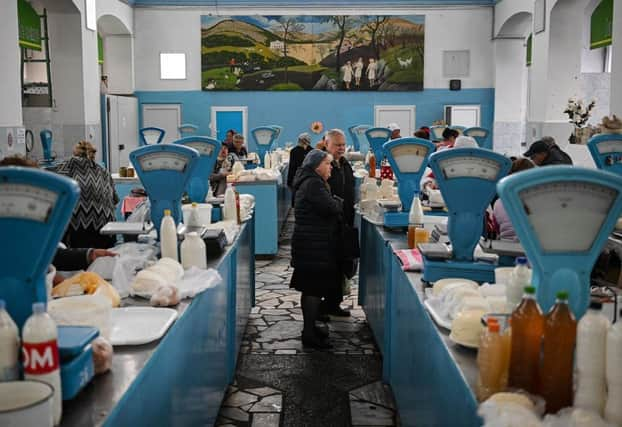War in Ukraine: Why is Moldova facing ‘humanitarian crisis’ over power blackouts?


Power failed across more than half of Moldova on Wednesday night for the second time this month, as Russian strikes hit infrastructure targets in neighbouring Ukraine.
President Maia Sandu said that she convened an emergency meeting of her national security council to discuss the energy supply crisis. Widespread attacks across Ukraine saw 70 Russian cruise missiles targeted at Ukrainian energy infrastructure overnight, with 51 shot down by the country’s air defences, in the most devastating assault since 15 November.
Advertisement
Hide AdAdvertisement
Hide Ad"We cannot trust a regime that leaves us in the dark and cold, that intentionally kills people, out of a simple desire to keep people in poverty and humiliation. However difficult it may be now, our only path, the future path of Moldova, must remain towards the free world," pro-EU president Ms Sandu said.
Moldova, which has a population of just 2.5 million, is uniquely vulnerable to the effects of the Russian invasion of Ukraine, due to its geographic location, small size and economic situation. It has also taken in more refugees from Ukraine per head of population than any other country.
Last month, a Moldovan village near the Ukraine border was hit by a stray missile shot down by a Ukrainian anti-aircraft system, damaging a number of houses. The country, unlike Poland, which suffered a similar incident last week, when two people were killed on a farm near Poland’s border with Ukraine, is not part of NATO.
On Wednesday, Moldovan foreign minister Nicu Popescu summoned the Russian ambassador over the increasing blackouts.
Earlier this week, French President Emmanuel Macron announced an international aid package of more than €100 million for Moldova, while other countries have also offered their support.
It was feared earlier on in the war that the Kremlin could create a land corridor through Moldova, via its pro-Russian breakaway region, Transnistria, which is a self-declared Soviet republic. Although Transnistria – a 250-mile long strip of land that lies on Ukraine’s south-west border - is not recognised internationally, it has a checkpoint from Moldova and has been controlled by pro-Russian authorities since 1991, when the country won its independence in a short civil war against the government in Chisinau after the break up of the Soviet Union.
Neighbouring Romania has said it has increased energy supply to Moldova, with which it shares a language and a long-standing cultural heritage. Moldova has long been divided between its Soviet Russian past and the West.
However, it is understood that even though Moldova now receives up to 90 per cent of its energy from Romania, its grid is tied to Ukraine's, and power blackouts occur due to the automatic disconnection of stations from the grid in order to prevent damage to the network. The construction of a 158km high-voltage overhead power line between Moldova and Romania began earlier this year and is due to be in operation in the next two years.
Advertisement
Hide AdAdvertisement
Hide Ad"Russia’s attacks on Ukraine’s energy infrastructure have left Moldova in the dark, again,” Mr Popescu said. “Massive blackouts across the country, including Chisinau and the [Moldovan foreign ministry] building.
“I instructed that Russia’s ambassador be summoned for explanations.”